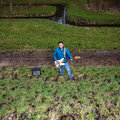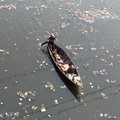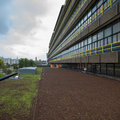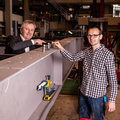News
30 January 2020
Making dikes safer with a bass guitar

Playing a bass guitar on top of a dike. It’s not something you see a TU Delft scientist do every day. Yet this is exactly how post-doc Juan Aguilar-López tested his experiment on dike monitoring with the use of fiber optic cables. A technology which could greatly improve dike safety in the future.
25 January 2020
Plastic-free Rivers

The oceans of the world are filling up with plastic waste carried there by rivers. Where it all comes from no one knows. Wim Uijttewaal, professor of Experimental Hydraulics and professor of Resources & Recycling Peter Rem are on a mission to make the rivers plastic free. ‘We want to turn the removal of plastic from rivers into big business. And we want to devise a plastic waste radar that will show where the plastic is, and how it got there.’
22 January 2020
Climate adaptation starts (roof) top down

TU Delft is going to become a little bit greener on top: the roof of one of the lecture rooms of the faculty of Civil Engineering and Geosciences has been turned into a sustainable ‘polder roof’. The green blue roof can collect, store and discharge rainwater in a controlled manner. For researcher Olivier Hoes (Watermanagement) the roof is a field lab to research how this smart roof deals with heavy rains and heat stress.
16 January 2020
Flatpack Buildings

Taking apart an entire multi-storey car park in the space of a couple of days and putting it back together again somewhere else without wasting any materials? It may sound like the engineering of a far-away future but it may happen sooner than you think. Recycling materials is common practice nowadays but is it the best solution for the environment? Milan Veljkovic and his team at TU Delft’s faculty of Civil Engineering and Geosciences knew there had to be another way. In partnership with other universities, institutes and companies in the EU they started REDUCE, a project aimed at finding technological solutions which contribute to the circular economy.
12 January 2020
BioXtreme is counting on the supercomputer

How do you go about processing an endless amount of data about the DNA material of micro-organisms? When Marjet Oosterkamp was researching industrial wastewater treatment she turned for help to the national supercomputer: it takes over when the human brain and standard computers have to throw in the towel.